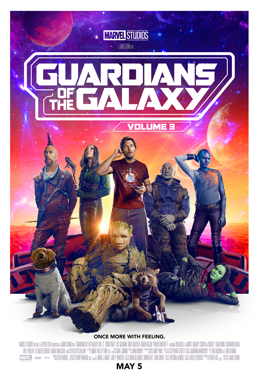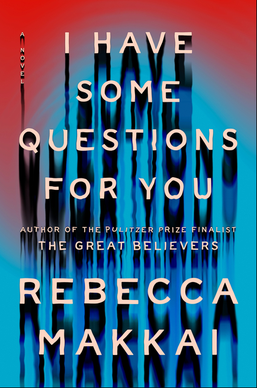Seeking
revenge of her humiliation at the Guardians of the Galaxy’s hands, Ayesha
(Elizabeth Debicki), high priestess of the Sovereign, sends her artificially
created son Adam (Will Poulter) after them. The Guardians are able to drive him
away, but Rocket (voice of Bradley Cooper) is badly wounded in the process.
Saving his life requires stealing a code from his creator, the High
Evolutionary (Chukwudi Iwuji), who sees Rocket as property that he is intent on
reclaiming as the evolved raccoon’s capacity for ingenuity is key to his plan to build a utopia for his “perfected” biological experiments.
The last
Marvel movie from writer/director James Gunn before he left to take over DC
Studios, Guardians Vol. 3 appears to follow other recent MCU missteps:
it’s long (two and a half hours), and it attempts to inject a darker tone and
weighty issues (animal cruelty, in this case) into a franchise known for humor.
And yet thanks to Gunn’s creative vision and the ensemble cast’s efforts, the
film largely works anyway.
The two
lynchpins of previous Guardians films are humor and heart, and both can be
found here. Vol. 3 is both irreverent – Chris Pratt’s Peter “Star-Lord” Quill shamelessly
bluffs his way past a receptionist during an infiltration mission and has some
rather creative insults for the High Evolutionary while Dave Bautista’s Drax
the Destroyer remains obliviously insensitive as ever – and sentimental with
the edge of the former preventing the latter from seeming too cloying or cheesy
(except, perhaps, at the very end). Perhaps it is the franchise’s facility with
juggling multiple tones that allows it to absorb the unabashed horror of exploring
Rocket’s backstory: a normal raccoon painfully experimented upon and threatened
with destruction for not meeting an impossibly high standard. Even though these
moments of animal abuse don’t crater the entire film, they do seem exploitatively
protracted.
Gunn’s
excesses aside, he still produced a stylish film that feels shorter than its
run time. The soundtrack is less awash in 70s pop than that of the preceding
two films. Though that decade is still represented (via Heart, Bruce
Springsteen, and Earth, Wind, and Fire), the eclectic mix also includes the
likes of Radiohead, Faith No More, and the Beastie Boys.
Most of
the Guardians cast has been playing their roles for several outings now, but a
change in narrative focus helps keep their performances from feeling stale. Quill
is, thankfully, no longer in the spotlight, Nebula (Karen Gillan) gains a
personality beyond merely being mean, and Drax is finally allowed to be more
than comic relief once again. Cooper and Sean Gunn (motion capture) help
transform Rocket from a mere mechanically-inclined cynical hothead into a
highly sympathetic figure. There are, of course, smaller returning characters
that have minimal presence: Ayesha is somehow even more ineffectual here, and
Sylvester Stallone’s space pirate Stakar has only two brief scenes.
The
newcomers leave an impression as well, albeit one that is quite different from
their source material. As Adam Warlock, Poulter is powerful but also naïve and
childlike. Iwuji’s take on the High Evolutionary replicates the first Guardians
movie’s defilement of Ronan the Accuser: strip out the comic book character’s
redeeming qualities and crank up the hammy evil. The film version shares an
obsession with achieving utopian perfection, but he’s also petty, sadistic, and
cruel.
If this is
the last Guardians film – and let’s hope, for sake of quality control, that it
is – then Vol. 3 brings the franchise to a memorable end. It is a far more
draining experience than the first or even the emotionally heavy second outing,
but it never completely loses its sense of fun.




































